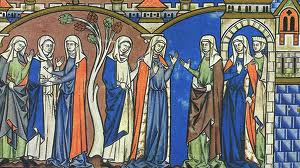The relations between mothers and daughters can be very turbulent even in the best of times. Imagine then the added complications when both women are queens?
An excerpt from "The Last Crusader Kingdom"
“Mama!”
Queen Isabella noticed her mother at last. “What brings you to Acre? When you left after Christmas Uncle Balian”
(as a child Isabella had picked up the habit of referring to her stepfather as
“Uncle Balian”) “said he didn’t expect to be back until after the sowing was
finished.”
“True.
We didn’t expect an emergency.”
“Emergency?
What’s happened? Have the rains caused flooding—”
Maria
Zoë was shaking her head, “No, no. Shall we sit outside in the fresh air?” She
indicated the courtyard bathed in morning sunshine.
Isabella
slipped her arm through her mother’s, and together they went out into the
little courtyard. The sun was pouring in and the surrounding buildings
protected it from the wind. They sat down on a plaster bench built against the
wall, and Isabella looked expectantly at her mother. “Tell me! What is it?”
“Actually,
you must already know,” Maria Zoë started cautiously. Her relationship with
Isabella was close, but it had also been stormy at times. There had been tense
periods when Isabella had been rebellious and aggressive. “Your brother John
rode all night to reach us.”
“Oh!”
Isabella gasped and drew back slightly, her face flushing. “You mean Aimery’s
arrest? Henri had to!” She defended her husband at once. “He can’t risk him
plotting against us for another hour! He promised me he would not put him
chains or anything like that, but he had to ensure Aimery could not communicate
with his brother or the Pisans!”
Maria
Zoë was relieved to hear that Isabella had at least extracted a promise of good
treatment; that alone would mean a great deal to Eschiva. More important, it
suggested that her daughter was not entirely indifferent to her best friend’s
husband. To her daughter she asked simply, “What is this all about, Isabella?
You’ve known Aimery all your life. You know he’s sacrificed the better part of his life for Jerusalem. How can you
think he might have turned traitor now?”
“He’s
a Lusignan, Mama! And you know his brother has never stopped claiming the crown
of Jerusalem. Guy did everything he could to prevent me obtaining what was
rightfully mine. He even talked Humphrey into telling me I had no claim as long
as he lived. And don’t you remember how he tried to ingratiate himself with the
Dowager Queen of Sicily, hoping to marry her? He’s still looking for a new
wife. If he marries again and has children, he will claim Jerusalem for them!”
Isabella hardly stopped for breath as she fervently delivered this monologue.
Maria
Zoë knew her daughter’s passionate nature, and nodded before countering in a
reasonable tone, “I don’t doubt a word you’re saying, Bella. Guy has been an
intriguer, a seducer, and arrogantly blind to his own faults for as long as
I’ve known him—which is more than a decade. But Aimery is not Guy—any more than
you are Sibylla.”
Isabella
had always hated her older half-sister Sibylla, so the argument made her catch
her breath and start biting her lower lip. Maria Zoë pressed her point. “I know
Aimery backed Guy’s usurpation six years ago, but he has lived to regret that a
thousand times over. He’s told me that himself, he’s told your stepfather, and
he’s told your brother the same thing. I honestly do not think that he could be
involved in any kind of plot against you or Henri, even if—as has not yet be proved—his brother is behind the Pisan pirates
preying on our shipping.”
Isabella
was frowning and biting her lip in distress. “You’re probably right, Mama. I want to believe you, for Eschiva’s sake
if nothing more, but arresting him was a precaution Henri had to take. If he’s innocent, then I’m sure Henri will release
him.”
Maria
Zoë took a deep breath and concluded this was probably the most she could hope
to gain at the moment. Pressing Isabella too hard could easily trigger an angry
rejection of “interference.” It would have been easier to back off, however, if
she hadn’t spent the night with Eschiva and her children. Eschiva, usually so
calm and self-possessed, had broken down and cried in Maria Zoё’s arms. Eschiva
had lived with Maria Zoë and Balian as a child, and the ties had never
weakened. Maria Zoë loved Eschiva like one of her own daughters, and she knew
how much Eschiva had suffered over the years―from Aimery’s infidelities in his
youth, from his captivity after Hattin and his absence at the siege of Acre,
and more recently from the uncertainties of this last military campaign under
the King of England. She and Aimery had only just started to rebuild their
lives―and now this.
“That’s
really the best I can promise,” Isabella spoke into Maria Zoë’s thoughts,
sounding faintly defiant already.
“I
know, Bella,” Maria Zoë chose tactical retreat. “That’s all I ask.” She smiled
and kissed her firstborn on the forehead and then stood. “I must get back to
Eschiva. She’s understandably very distraught and frightened.”
“You
must assure her that no matter what comes to light about Aimery, she will
always be a sister to me. I promise she’ll never be made to suffer, even if
Aimery is found to be a traitor.”
“Ah,
but sweetheart, if anything happens to Aimery she will suffer, because she loves him—not as you love Henri, nor
indeed as I love your stepfather, but as a woman who has known no other husband
since she was eight years old. Aimery is her life, Bella. If you take Aimery
away, Eschiva will simply die.” Maria Zoë patted her daughter’s shoulder as if
comforting her―but judging by Isabella’s stricken face, her message had gone
home.










